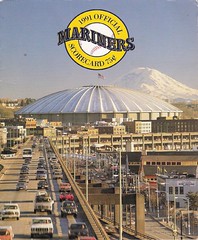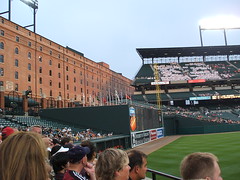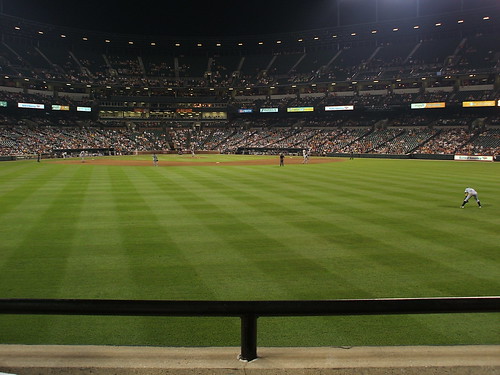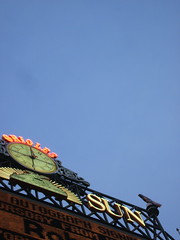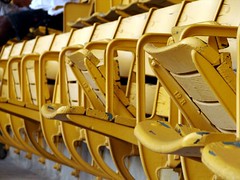kingdome
The first game I ever saw was in 1991 at Seattle's Kingdome, in Seattle. The stadium left much to be desired. It was a bleak concrete building with artificial turf on the field and artificial lighting flooding down from the ceiling. But for a 13-year-old baseball fan who had started to fanatically follow the game on TV and had been immersed in books on the history of the game, it was more than good enough.
It would be several more years before I'd have the experience of walking out the tunnel to my seats and seeing the sun gleam off an emerald grass field. But my first game impressions are still shining and glorious in my memory.
If I saw the same game today, the atmosphere would mostly inspire apathy. It was a Wednesday afternoon game (I didn't actually remember the day of the week - certain details have been supplied by the wonders of internet box scores). The official attendance was about 19,000, which seems high. Even then, I knew the crowd was sparse; in my mind I think 12,000 would be a better estimate. We arrived well early and took seats behind third base (I wonder what those seats cost at the time?). I'm not sure if we actually were there for batting practice, but I remember having a lot of time to take in the details: the expanse of seats, the crisp colors of the uniforms, the size of the scoreboard. We picked up souvenir miniature bats. I ended up with a scorecard which I still have. I can go back and look over my attempt at keeping score (I was lost on how to denote a first-inning pinch runner). I don't remember the details of what happened on the field. Before I found the scorecard I knew the game was against the Red Sox, I knew Ken Griffey, Jr. hit a home run and I was pretty sure the Mariners won.
I remember even at the time not having a great grasp on the play-by-play; leaving the stadium, I was a bit disappointed in my brain for not remembering everything exactly, and instead having more general impressions. A few moments, however, were vivid then and still easily accessed. The crowd noise going from indifferent to what (at the time) seemed insanely loud after Griffey's home run. We were right in front of the Red Sox bullpen, and crowded with other kids along the front rail to try and get autographs. I had no idea who Tony Pena was, but I knew that was the name of the Red Sox' backup catcher who was signing autographs, and who stopped just before he worked his way to us.
(I also learned a lesson that day, one my parents probably would prefer hadn't been as long-lasting.
My father parked our minivan in a two-hour spot during the game. When we returned to the vehicle, there was a ticket on the windshield. Us four kids (aged 13-7) who simply understood tickets were bad, were concerned. Our parents deflated our anxiety by remarking, "No one pays parking tickets in a city they're not from." Or at least one you're not going to soon return to. It's a lesson I've adhered to.
My parents got notices of the ticket for many years after. Seattle would send them a notice every year or two a year saying the ticket was delinquent and adding penalties to the total. Until one year the notices just stopped coming. There's no chance of them taking that van back to Seattle, so I'd say they're safe.)
The next day my father, brother and I went back to the Kingdome, this time for a night game against the Tigers. The tickets this time were free, thanks to collecting a quantity of Raisin Bran box tops. The Tigers that year were known for free-swinging power hitters: Cecil Fielder, Rob Deer (I didn't have to look up those two. I did have to look up to find out Mickey Tettleton was also on his way to hitting 31 home runs). I remember we got to the park a bit late; we probably didn't see Fielder hit a first-inning home run. I don't know if we saw Rob Deer hit a second-inning homer.
I do remember watching a late home run win the game for the Mariners. In my mind, it was Harold Reynolds hitting the winning home run in the ninth inning. According to the box score, it was Alvin Davis putting the Mariners ahead in the eighth. Either way, I remember watching the ball from the upper deck, seeing it fly on a low arc along the right-field line and just fair into in the stands. I've seen a lot of home runs since, but few are seared into my memory like that one.
(Looking here, I see the Mariners' average ticket price in 1991 was $7(!). Hot dogs were $1.50; beer $2.50. The Kingdome might not have been great, but at least it wasn't also unaffordable.)
 The archived ramblings of my time as a world traveler up to my current life in Washington, D.C.
The archived ramblings of my time as a world traveler up to my current life in Washington, D.C.